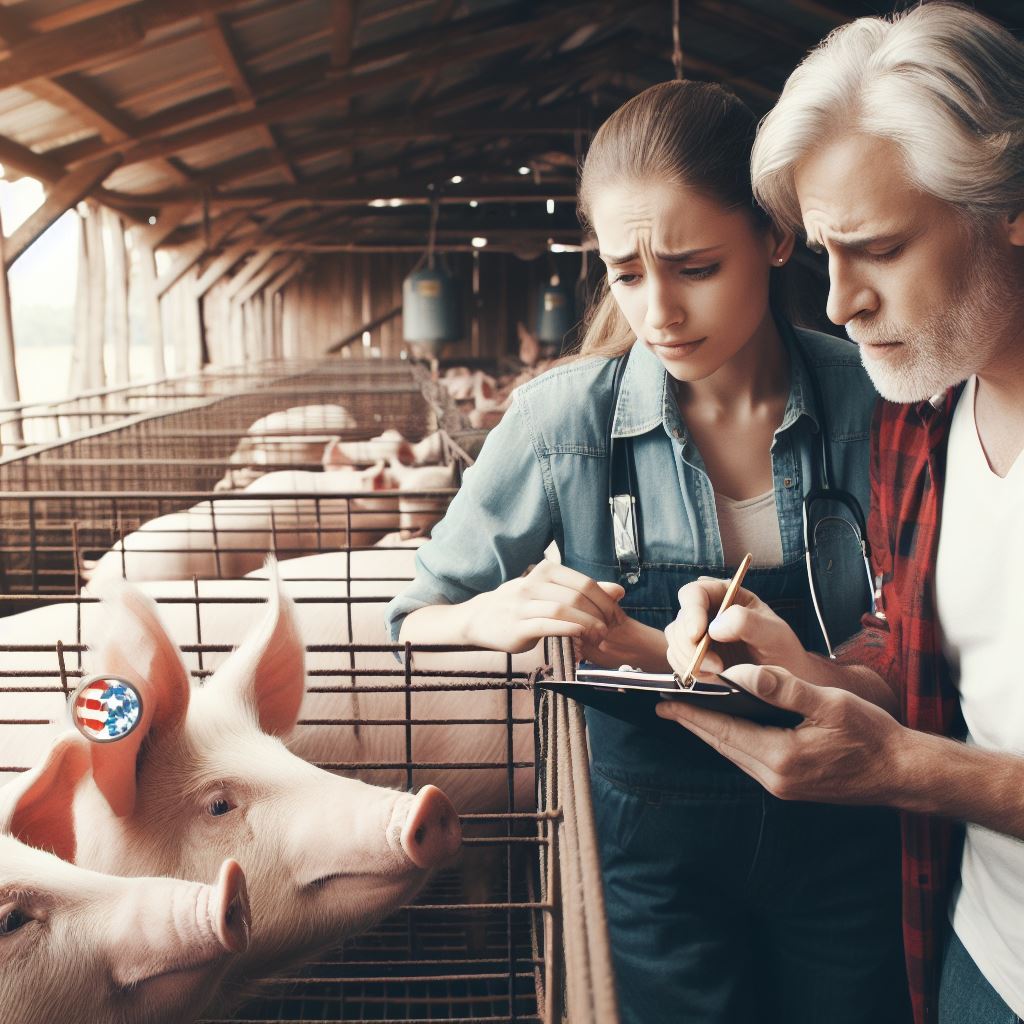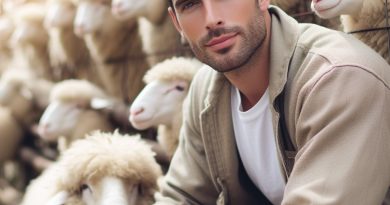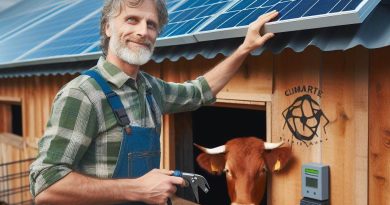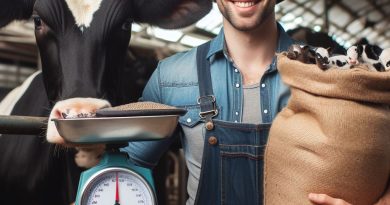Winter Care for Livestock: A Complete Guide
Last Updated on March 2, 2024
Introduction
Importance of winter care for livestock
Winter is a critical time for livestock as they are more susceptible to cold, stress, and health issues.
Providing proper care during this season is crucial for their well-being.
Overview of the blog post
In this blog post, we will discuss the essential aspects of winter care for livestock.
We will cover topics such as shelter, nutrition, water, health care, and specific considerations for different types of animals.
Additionally, we will provide practical tips and recommendations to ensure the well-being of your livestock throughout the winter months.
Shelter
Livestock shelters should be well-insulated, windproof, and provide adequate space to protect animals from harsh weather conditions.
Nutrition
During winter, livestock require additional calories to maintain their body temperature.
Provide them with high-quality forage, balanced feed, and consider supplements if needed.
Water
Ensure that livestock have access to fresh, clean water at all times. Use heated water sources or prevent water from freezing.
Health Care
Regularly inspect animals for signs of illness or injury. Vaccinate and deworm them as needed.
Pay attention to foot care, as animals can develop foot problems in wet and muddy conditions.
Specific Considerations
Different livestock require specific care. Adjust your winter care practices according to the needs of cattle, horses, sheep, goats, and poultry.
In essence, winter care for livestock is of utmost importance to ensure their well-being and productivity.
By providing proper shelter, nutrition, water, and health care, you can help your animals stay healthy and comfortable during the winter months.
Stay tuned for more detailed tips in the upcoming sections.
Preparing the Shelter
Insulating the barn or shelter
- Install insulation in the walls and ceiling to prevent heat loss.
- Choose insulation materials that are safe for animals and resistant to moisture.
- Seal any gaps or cracks that can let cold air in and warm air out.
- Consider using heat lamps or heaters, but follow safety guidelines and monitor them carefully.
Providing ample bedding for warmth
- Use thick layers of straw or hay as bedding for animals.
- Make sure the bedding is dry and changed regularly to prevent moisture buildup.
- Provide enough bedding to create a comfortable and insulating layer for the animals.
- Consider using deep bedding systems, which provide additional warmth and insulation.
Ensuring proper ventilation
- Install vents and windows that can be opened or closed to control airflow.
- Proper ventilation prevents condensation and reduces the risk of respiratory issues.
- Avoid sealing the barn or shelter completely, as it can lead to poor air quality.
- Monitor temperature and humidity levels to ensure optimal ventilation.
Checking for leaks or drafts
- Regularly inspect the barn or shelter for any leaks or drafts.
- Check doors, windows, and walls for cracks or gaps.
- Use caulking or weatherstripping to seal any areas where cold air might enter.
- Repair any damaged roofing or siding that can cause leaks or drafts.
By following these steps, you can ensure that your livestock shelter is well-prepared for the winter months.
Read: Poultry Management: Key Practices Revealed
Feeding Strategies
Adjusting feed to meet increased energy demands
During the winter months, livestock require additional energy to maintain their body temperature and stay warm.
Adjusting their feed accordingly is crucial for their well-being.
- Increase the amount of feed given to the animals to provide them with enough energy.
- Consult a veterinarian or an animal nutritionist to determine the appropriate feed adjustments.
- Consider using feed supplements that are specifically formulated for winter conditions.
- Monitor the animals’ body condition to ensure they are receiving sufficient nutrients.
Providing high-quality forage
Ensuring that your livestock have access to high-quality forage is essential for their overall health and well-being during the winter.
- Store hay properly to prevent spoilage and preserve its nutritional value.
- Inspect hay for mold, dust, or any signs of deterioration before feeding it to the animals.
- Consider supplementing the forage with other nutrients, such as grain or protein concentrates, if available.
- Monitor the animals’ consumption of forage to ensure they are getting enough nutrients.
Offering water at optimal temperature
Water is a crucial component of livestock’s diet, even during the cold winter months. Providing water at the optimal temperature is essential to keep the animals hydrated.
- Ensure that water sources are not frozen, and provide alternative options if necessary.
- Use heated water buckets or troughs to prevent the water from freezing.
- Check water sources daily and break the ice if needed to allow access to fresh water.
- Monitor the animals’ water intake to ensure they are adequately hydrated.
Supplementing with necessary vitamins and minerals
Supplementing livestock’s diet with vitamins and minerals is crucial, especially during the winter months when their access to fresh vegetation may be limited.
- Consult with a veterinarian or an animal nutritionist to determine the appropriate supplements for your livestock.
- Consider providing loose salt, as animals’ requirements for sodium increase during the winter.
- Ensure that the supplements are easily accessible to the animals and are consumed regularly.
- Monitor the animals’ health and adjust the supplements as needed based on their condition.
By following these feeding strategies, you can ensure that your livestock receive the necessary nutrients and care they need during the winter months.
Remember to consult with professionals and closely monitor your animals’ health to make any necessary adjustments to their diet.
Read: Boosting Goat Health: Nutrition & Care Tips
Managing Health and Well-being
Regular veterinary check-ups
- Schedule regular visits with a veterinarian to ensure the overall health and well-being of your livestock.
- Veterinarians can perform physical exams, check for any signs of illness, and provide necessary treatments or medications.
- Early detection of health issues through regular check-ups can prevent small problems from becoming major concerns.
- Discuss any specific concerns or management practices with the veterinarian to optimize the health of your animals.
Vaccinations and parasite control
- Follow a proper vaccination schedule recommended by your veterinarian to protect your livestock from common diseases.
- Vaccinations can prevent serious illnesses and reduce the risk of infections spreading within your herd.
- Regular deworming and parasite control programs are essential for the well-being of your livestock.
- Consult with your veterinarian to determine the appropriate deworming products and frequency for your specific livestock.
Monitoring weight and body condition
- Keep track of your livestock’s weight and body condition regularly to ensure they are in good health.
- Weight changes can indicate underlying health issues or nutritional imbalances that need attention.
- Work with a veterinarian or animal nutritionist to develop a proper diet plan based on the specific needs of your livestock.
- Adjust the feeding regimen and monitor the body condition score to maintain optimal health and prevent over/underweight conditions.
Minimizing stress and keeping animals mentally stimulated
- Provide a clean and comfortable environment for your livestock to minimize stress and promote overall well-being.
- Reduce loud noises, sudden movements, and other potential stressors that can negatively affect your animals.
- Offer environmental enrichment such as toys, scratching posts, or social interaction to keep livestock mentally stimulated.
- Implement proper handling techniques during routine management practices to minimize stress on the animals.
- Regular exercise or access to pasture can also contribute to the mental well-being and overall health of your livestock.
By following proper management practices and focusing on the health and well-being of your livestock, you can ensure their overall winter care.
Regular veterinary check-ups, vaccinations, weight monitoring, and stress reduction strategies are all essential for keeping your animals healthy and happy during the colder months.
Read: Pig Farming 101: Basics for Beginners
Protecting from Extreme Weather Conditions
Offering windbreaks or sheltered areas
During winter, it’s essential to provide sheltered areas, such as barns or sheds, to protect livestock from strong winds.
Utilizing blankets or coats for vulnerable animals
For animals with less natural insulation, like newborns or seniors, using blankets or coats can provide extra warmth.
Clearing snow and ice from paths and access points
Regularly clearing snow and ice from paths and access points ensures safe movement for both livestock and caretakers.
Keeping animals indoors during severe weather events
When severe weather events, such as blizzards, occur, it’s best to keep animals indoors to avoid exposure and potential harm.

See Related Content: Organic Animal Health Care
Find Out More: Sustainable Rabbit Farming 101
Explore Further: Rotational Grazing: A Complete Guide
Handling Ice and Snow
Removing ice and snow build-up around the shelter
- Regularly inspect and remove any accumulated ice and snow around the livestock shelter.
- Use a shovel or snow blower to clear the roof of the shelter to prevent collapse.
- Clear ice and snow from gutters and downspouts to ensure proper drainage.
- Prevent the formation of dangerous icicles by removing any icicle formations promptly.
Clearing pathways for livestock movement
- Shovel and salt pathways regularly to maintain a clear path for livestock movement.
- Use sand or sawdust on slippery surfaces to provide better traction for livestock.
- Install rubber mats or wooden pallets in high-traffic areas to minimize slipping incidents.
- Enforce a regular cleaning schedule to prevent accumulation of ice and snow in livestock pens.
Ensuring access to fresh water
- Check water sources frequently to ensure they are not frozen or inaccessible to livestock.
- Use heated waterers or install insulation around pipes to prevent freezing.
- Break and remove ice from water troughs regularly to allow livestock access to unfrozen water.
- Provide additional water sources or heated buckets in case of temporary water source failures.
Preventing ice-related injuries
- Trim the hooves of livestock regularly to maintain proper traction and prevent slipping.
- Use abrasive materials like sand or gravel in areas prone to ice formation.
- Consider using hoof boots or pads to improve traction on slippery surfaces.
- Observe livestock regularly for any signs of injuries caused by slipping on ice.
Proper handling of ice and snow is essential to ensure the well-being and safety of livestock during the winter season.
By removing ice and snow build-up around the shelter, clearing pathways, ensuring access to fresh water, and taking precautionary measures, you can minimize the risk of ice-related injuries and provide a comfortable environment for your livestock.
Stay vigilant and proactive in winter care to promote the health of your animals.
Read: Pasture Rotation: Benefits and Techniques
See Related Content: Solar Power in Livestock Farming: A Guide
Learn More: Climate-Smart Cattle Farming
Managing Special Considerations for Different Livestock
Caring for horses in winter
- Provide proper shelter for horses, ensuring it is well-ventilated and protected from harsh winds.
- Increase their forage intake to provide the necessary calories to stay warm.
- Monitor their water supply regularly, ensuring it is kept ice-free.
- Blanket horses as needed, but ensure they can still move freely.
- Minimize exercise during extreme cold weather to prevent excessive sweating.
- Regularly check their hooves for snow build-up and ice balls.
- Be prepared for potential health issues like colic and respiratory problems in winter.
- Consult a veterinarian for specific dietary and healthcare requirements for horses in winter.
Winter care for cattle
- Provide adequate shelter for cattle, ensuring it is well-insulated and protected from drafts.
- Increase their feed intake with high-quality forage or hay to maintain body condition.
- Continuous access to fresh water is essential; use heated waterers or break ice regularly.
- Make sure the barn or shelter is clean, dry, and well-bedded to prevent health issues.
- Protect them from frostbite by applying a protective coating on their udders and teats.
- Monitor their body condition regularly and consult a veterinarian for any concerns.
- Vaccinate cattle appropriately to prevent common winter diseases like respiratory infections.
- Check fencing regularly for any damages caused by heavy snow or ice.
Sheep and goats in cold weather
- Provide a draft-free shelter that is well-insulated for sheep and goats.
- Increase their feed intake with high-quality hay or forage to meet their energy needs.
- Ensure they have access to fresh water at all times, using heated sources if necessary.
- Regularly check their hooves for potential issues and trim them if needed.
- Use bedding materials that provide warmth and absorb moisture effectively.
- Monitor their body condition regularly and adjust feed amounts accordingly.
- Vaccinate them against common winter diseases like pneumonia and clostridial infections.
- Provide proper ventilation to prevent condensation and moisture build-up in the shelter.
Poultry and winter management
- Provide a well-insulated coop with proper ventilation, protecting birds from drafts and moisture.
- Use bedding material to keep the coop dry and provide insulation against the cold.
- Ensure they have continuous access to fresh water, using heated sources to prevent freezing.
- Increase their feed to compensate for the extra energy needed to stay warm.
- Supplement their diet with cracked corn or scratch grains for added warmth.
- Monitor for signs of frostbite and be prepared to provide necessary medical care if needed.
- Maintain proper hygiene in the coop to prevent the spread of diseases.
- Protect them from predators that may be more desperate for food during winter months.
By following these guidelines, you can properly care for your livestock during the winter season, ensuring their health and well-being.
Read: Water Management in Livestock Farming
Conclusion
Recap of winter care strategies
In closing, providing optimal care for livestock during winter is crucial to their well-being and productivity.
By implementing the strategies discussed in this guide, such as providing shelter, adequate nutrition, and proper water sources, farmers can ensure the health and comfort of their animals.
Importance of providing optimal care for livestock during winter
The harsh winter conditions can pose significant challenges for livestock, leading to health issues, decreased productivity, and even death.
Therefore, it is essential to prioritize their well-being by implementing appropriate winter care strategies.
By taking steps to protect livestock from the cold, wind, and precipitation, farmers can prevent frostbite, hypothermia, and other weather-related ailments.
Providing proper nutrition, such as high-quality forage and supplements when necessary, helps maintain their energy levels and body condition.
Additionally, ensuring access to clean and unfrozen water is crucial for proper hydration and overall health.
This can be achieved through the use of heated waterers, insulating water sources, or providing warm water at regular intervals.
By prioritizing winter care, farmers not only safeguard their animals but also enhance their productivity.
Healthy and comfortable livestock are more resistant to diseases, more efficient in converting feed to products, and more likely to reproduce successfully.
Overall, by following the recommended winter care strategies, farmers can mitigate the risks associated with winter and ensure the well-being of their livestock.
By providing optimal care, they contribute to the success and sustainability of their farming operations.


